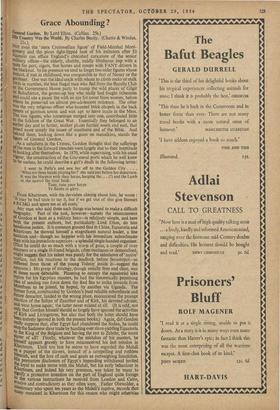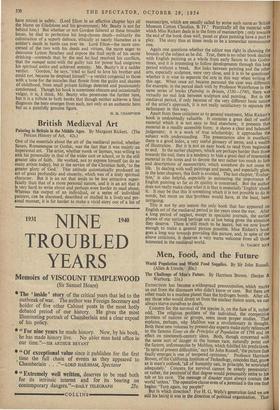encral Cordon. By Lord Elton. (Collins. 25s.) Nor even the
`stern Cromwellian figure' of Field-Marshal Mont- gomery and, the pious tight-lipped host of his imitators after El Alamein can efface England's cherished caricature of the senior military officer—the elderly, chubby, mildly libidinous imp with a taste for port, cigars, fine horses and romps with FANY drivers in the blackout. In his presence we tend to forget two older figures whose tolpact, if met in childhood, was comparable to that of Nanny or the gardener. One was the ideal uncle with whom to climb rocks or stalk birds in marshes, the lean frugal man who fled from the Byculla Club Or the Government, House party to tramp the wild places of Gilgit or Baluchistan, the grown-up boy who really had fought tribesmen sad could site a picnic fire with an eye for cover from women, before whom he preserved an almost pre-adolescent reticence. The other Was the very religious officer who haunted brick chapels in the back streets of garrison towns and was apt to leave tracts in the Mess. The two figures, who sometimes merged into one, contributed little to the folklore of the Great War. Essentially they belonged to an earlier day and to hotter, starker pl.Ices further south and cast, that Posed more simply the issues of manliness and of the Bible. And behind them, looking down like a giant on mannikins, stands the figure of General Gordon.
As a subaltern in the Crimea, Gordon thought that the sufferings of the men in the forward trenches were largely due to their ineptitude in looking after themselves. In 1870, while supervising, with his usual vigour, the construction of the Gravesend ports which he well knew to be useless, he could describe a girl's death in the following terms: I went to Polly's and saw her off to the Golden City . . . . `What arc these bands playing for?' she said just before her departure. It was the Harpers with their harps, harping the ... (?) and the Lamb as she neared the river bank.
Tune, tune your harps Ye Saints in glory.
From Khartoum, with the dervishes closing about him, he wrote : It may be bad taste to say it, but if we get out of this give Stewart It KCMG and spare me at all costs.' have retired in safety. (Lord Elton in an effective chapter lays all the blame on Gladstone and his government; Mr. Beatty is not far behind him.) But whether or not Gordon faltered at these broader issues, he died to perfection his long-chosen death—militarily the culmination of a superb defence, ethically as nearly blameless as a soldier's death in battle can ever be. Lord Elton—the more con- cerned of the two with his deeds and virtues, the more eager to denounce Lytton Strachey and expose the frail myth of his secret drinking—contends that by the end he had resolved his conflicts, that the marine saint with the guilty lust for power had outgrown his spiritual antics and achieved serenity. Mr. Beatty's is a sadder verdict. 'Gordon,' he says, 'tried so hard to love his brother and could not, because he despised himself'—a verdict congenial to those with a taste for the miracles that flower from the guilts and shames of childhood, from small private failings detected and passionately condemned. Though his book is sometimes obscure and occasionally vulgar, it is, I think, Mr. Beatty who penetrates the further here, but it is a tribute to both books that though neither achieves a final diagnosis the hero emerges from each, not only as an authentic hero but as a painfully genuine figure.



































 Previous page
Previous page